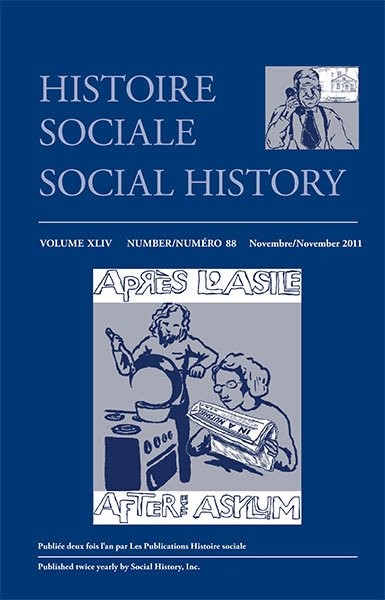Deinstitutionalization Reconsidered: Geographic and Demographic Changes in Mental Health Care in British Columbia and Alberta, 1950–1980
DOI :
https://doi.org/10.1353/his.2011.0020Résumé
Using demographics on admission to, and discharge from, mental hospitals in Alberta and British Columbia, this paper analyzes the social process commonly framed as deinstitutionalization between 1950 and 1980. A focus on the two most western Canadian provinces permits an exploration of these changes in these regional contexts. Pressured by new funding arrangements, a shift towards community care, and growing criticism of the alleged oppressive nature of large institutions, the three main mental hospitals scaled down as of the 1950s. This trend did not mean, however, that the overall number of hospitalized patients decreased during this time period. The total number of hospitalizations, particularly short-term admissions, actually expanded, while trans-institutionalization also occurred. This case study mirrors larger trends of postwar mental health care, illustrating the social, political, and cultural challenges experienced in the reconstruction of institutional care. Cet article analyse le processus social connu sous le terme de désinstitutionnalisation, entre 1950 et 1980 en Alberta et en Colombie-Britannique, à partir de données démographiques sur les admissions et les sorties des hôpitaux psychiatriques. Une étude de la situation dans les deux provinces les plus à l’ouest du Canada permet d’analyser ces changements dans ces contextes régionaux. À la suite de nouveaux mécanismes de financement, d’un recadrage des soins communautaires et d’une critique croissante de la nature prétendument écrasante des grands établissements, chacun des trois principaux hôpitaux a réduit son envergure au cours des années 1950. Néanmoins, cette tendance n’a pas entraîné, au cours de cette période, une diminution du nombre global des patients hospitalisés. De fait, le nombre total des hospitalisations, et plus particulièrement celles de courte durée, a augmenté au moment où se produisait un phénomène de trans-institutionnalisation. Cette étude de cas reflète les principales tendances des soins apportés aux maladies psychiatriques de l’après-guerre et illustre les défis – sur un plan social, politique et culturel – auxquels s’est heurtée la reconstruction des soins en établissements.Téléchargements
Numéro
Rubrique
Articles


